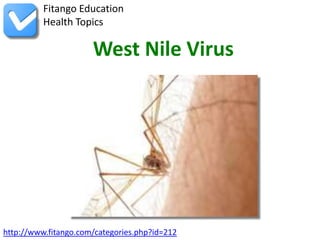
West Nile Virus: Symptoms, Causes, Prevention and Risk Factors
- 1. Fitango Education Health Topics West Nile Virus http://www.fitango.com/categories.php?id=212
- 2. Overview West Nile virus (WNV) is an infectious disease that first appeared in the United States in 1999. WNV is spread when mosquitos infected with the disease bite humans or animals. People who contract WNV usually have no symptoms or mild symptoms. Those with symptoms may have a fever, headache, body aches, skin rash or swollen lymph glands. 1
- 3. Overview If West Nile virus enters the brain, it can be deadly. It may cause inflammation of the brain, called encephalitis, or inflammation of the tissue that surrounds the brain and spinal cord, called meningitis. http://www.nlm.nih.gov/medlineplus/westnileviru s.html 2
- 4. Symptoms Some people infected with WNV will develop severe illness. The severe symptoms can include high fever, headache, neck stiffness, stupor, disorientation, coma, tremors, co nvulsions, muscle weakness, vision loss, numbness and paralysis. These symptoms may last several weeks, and neurological effects may be permanent. 3
- 5. Symptoms Up to 20 percent of the people who become infected have milder symptoms such as fever, headache, body aches, nausea, vomiting, and sometimes swollen lymph glands or a skin rash on the chest, stomach and back. Symptoms can last for as short as a few days, though even healthy people have become sick for several weeks. 4
- 6. Symptoms Approximately 80 percent of people (about 4 out of 5) who are infected with WNV will not show any symptoms at all. http://www.cdc.gov/ncidod/dvbid/westnile/wnv_f actsheet.htm 5
- 7. Diagnosis Milder WNV illness improves on its own, and people do not necessarily need to seek medical attention for this infection though they may choose to do so. If you develop symptoms of severe WNV illness, such as unusually severe headaches or confusion, seek medical attention immediately. Severe WNV illness usually requires hospitalization. Pregnant women and nursing mothers are encouraged to talk to their doctor if they develop symptoms that could be WNV. 6
- 8. Diagnosis People typically develop symptoms between 3 and 14 days after they are bitten by the infected mosquito. http://www.cdc.gov/ncidod/dvbid/westnile/wnv_f actsheet.htm 7
- 9. Treatment There is no specific treatment for WNV infection. In cases with milder symptoms, people experience symptoms such as fever and aches that pass on their own, although even healthy people have become sick for several weeks. In more severe cases, people usually need to go to the hospital where they can receive supportive treatment including intravenous fluids, help with breathing and nursing care. 8
- 10. Causes West Nile Virus is caused by the following: -- Infected Mosquitoes. Most often, WNV is spread by the bite of an infected mosquito. Mosquitoes become infected when they feed on infected birds. Infected mosquitoes can then spread WNV to humans and other animals when they bite. 9
- 11. Causes -- Transfusions, Transplants, and Mother-to-Child. In a very small number of cases, WNV also has been spread through blood transfusions, organ transplants, breastfeeding and even during pregnancy from mother to baby. http://www.cdc.gov/ncidod/dvbid/westnile/wnv_f actsheet.htm 10
- 12. Risks People over the age of 50 are more likely to develop serious symptoms of WNV if they do get sick and should take special care to avoid mosquito bites. 11
- 13. Risks Being outside means also you're at risk. The more time you are outdoors, the more time likely you are to be bitten by an infected mosquito. Pay attention to avoiding mosquito bites if you spend a lot of time outside. **Other possible risks include** : 12
- 14. Risks -- Donated Blood. All donated blood is checked for WNV before being used. The risk of getting WNV through blood transfusions and organ transplants is very small, but if you have concerns, talk to your doctor about the risks. -- Pregnancy and Nursing. The risk that WNV may be passed down to a fetus or infant through breastmilk is still being evaluated. Talk to your health care provider if you have questions. 13
- 16. Prevention Prevention measures consist of community-based mosquito control programs that are able to reduce vector populations, personal protection measures to reduce the likelihood of being bitten by infected mosquitoes, and the underlying surveillance programs that characterize spatial/temporal patterns in risk that allow health and vector control agencies to target their interventions and resources. 15
- 17. Prevention **** **The easiest way to avoid WNV is to prevent mosquito bites** : -- When outdoors, use insect repellent with an EPA-registered active ingredient 16
- 18. Prevention **** -- Get rid of mosquito breeding sites by emptying standing water from flower pots, buckets or barrels. Change water in bird baths and pet dishes weekly. -Keep children's wading pools empty when they aren't being used -- Wear long sleeves and pants, if possible -- Stay indoors between dusk and dawn, when mosquitoes are most active 17
- 19. Prevention **** -- Use screens on windows to keep mosquitoes out *Older people are more at risk for West Nile Virus, so they should be especially careful. http://www.cdc.gov/ncidod/dvbid/westnile/wnv_f actsheet.htm 18